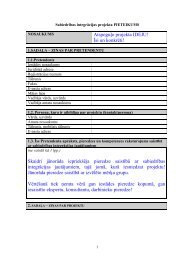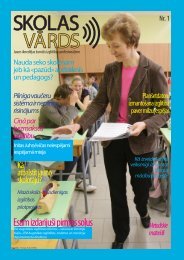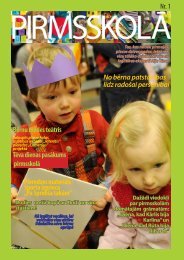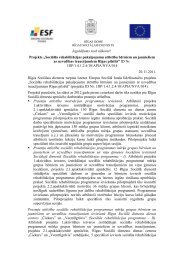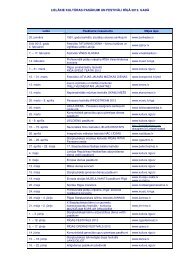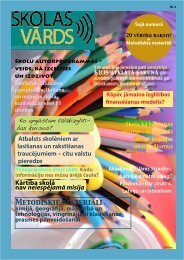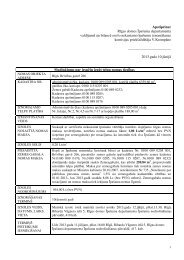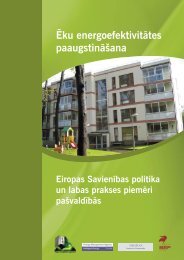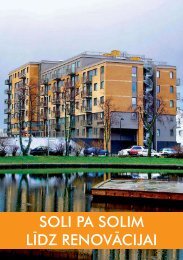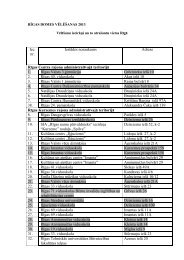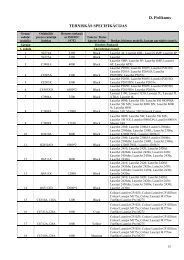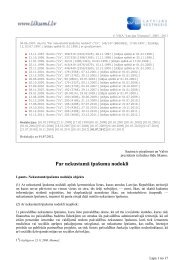Riga - European Capital of Culture 2014 candidate
Riga - European Capital of Culture 2014 candidate
Riga - European Capital of Culture 2014 candidate
- No tags were found...
You also want an ePaper? Increase the reach of your titles
YUMPU automatically turns print PDFs into web optimized ePapers that Google loves.
The “Mobile Centre” is <strong>Riga</strong>’s proposal for promoting andenhancing communication in <strong>2014</strong>, serving as the messenger<strong>of</strong> the <strong>European</strong> <strong>Capital</strong> <strong>of</strong> <strong>Culture</strong> (ECC). Since the yearwill also mark the 10 th anniversary <strong>of</strong> Latvia’s accession tothe <strong>European</strong> Union, communication between <strong>Riga</strong> andother cities <strong>of</strong> Latvia and Europe will play a very importantrole in the <strong>Capital</strong> <strong>of</strong> <strong>Culture</strong> project, strengthening<strong>European</strong> values. Since Latvia is one <strong>of</strong> the easternmostcountries in the EU, the “Mobile Centre” as the messenger<strong>of</strong> the <strong>Riga</strong> project is vital to society psychologically,emphasizing the equal importance <strong>of</strong> the zone <strong>of</strong>ten consideredperipheral to the continuing development <strong>of</strong> the<strong>European</strong> Union. The ‘Mobile Centres’ will create a spacewhere citizens <strong>of</strong> <strong>Riga</strong>, Latvia and Europe will find a forumto communicate the values important to their towns.The <strong>Riga</strong> project for <strong>2014</strong> envisages the decentralisation <strong>of</strong> culturalevents and the broad participation <strong>of</strong> the public in the <strong>European</strong><strong>Capital</strong> <strong>of</strong> <strong>Culture</strong> programme not only in the environs <strong>of</strong> the capitalbut throughout Latvia and with a <strong>European</strong> dimension extendingto other EU countries.To more effectively attain these goals, small groups <strong>of</strong> messengersas well as larger ‘messenger units’ will spread the project’smessage through their visual design. These <strong>Capital</strong> <strong>of</strong> <strong>Culture</strong>mobile centre units will play a significant role beyond merely marketingthe project symbolically.the University, work-related travel and attendance at major events.The ‘Mobile Centres’ will bring other towns closer to <strong>Riga</strong> as anintegral aspect <strong>of</strong> the <strong>Capital</strong> <strong>of</strong> <strong>Culture</strong> project’s aim to embody<strong>European</strong> values, emphasising the cultural and historical links between<strong>Riga</strong> and other towns and <strong>of</strong>fering visitors the opportunityto express their ideas, abilities and know-how.<strong>Riga</strong> has invited other towns in the region to follow the example<strong>of</strong> Sigulda and declare their readiness to participate in developingthe <strong>European</strong> <strong>Capital</strong> <strong>of</strong> <strong>Culture</strong> programme’s “MobileCentre.” Formal letters <strong>of</strong> agreement have been submitted byJūrmala, Daugavpils, Jelgava, Kuldīga, Dobele, Tukums, Limbaži,Staicele, Aloja, Salacgrīva, Balvi and Ventspils. Cēsis and Liepāja,also competing to become the <strong>European</strong> <strong>Capital</strong> <strong>of</strong> <strong>Culture</strong>, haveagreed in writing that they are prepared to cooperate in individualprojects if <strong>Riga</strong> is chosen as the ECC in <strong>2014</strong>.At the <strong>European</strong> and Baltic Sea region levels, the focus will beon Sweden, Latvia’s ECC partner state in <strong>2014</strong>, as well as on thetowns <strong>of</strong> the “New Amber Road”, a <strong>Riga</strong> initiative. The sayingpassed down since Swedish rule in the 17 th century – ‘the goodold Swedish era’ – will be the motto <strong>of</strong> an exhibit on wheels aboutthe current and historic ties between <strong>Riga</strong> and Sweden.The movement <strong>of</strong> the project from the centre <strong>of</strong> the city to theperiphery is the primary way in which <strong>Riga</strong> will inspire cooperationwithin the capital, the region, and throughout the country.Implementation <strong>of</strong> the “Mobile Centre” project in <strong>Riga</strong>’s outlyingdistricts will involve developing an expanded infrastructure,decentralising the city’s cultural facilities through development(the construction <strong>of</strong> a new cultural centre in the Latgale District,reconstruction <strong>of</strong> the philanthropist Augusts Dombrovskis’ early20 th century ‘palace <strong>of</strong> culture’ Ziemeļblāzma (“Northern Lights”)and the renovation <strong>of</strong> the historic district that surrounds it, andthe transformation <strong>of</strong> the Central Market’s warehouse area into a‘creative district’). The ‘Mobile Centres’ will have a long-term effecton urban development, serving as a platform for people-to-peoplecommunication and cultural activities as well as strengtheningneighbourhood identities.As a capital, <strong>Riga</strong> has intimate ties to other Latvian towns. In anage <strong>of</strong> rapid mobility, everyone in Latvia has developed a personalconnection to the capital – relatives, friends, children studying at136 137



